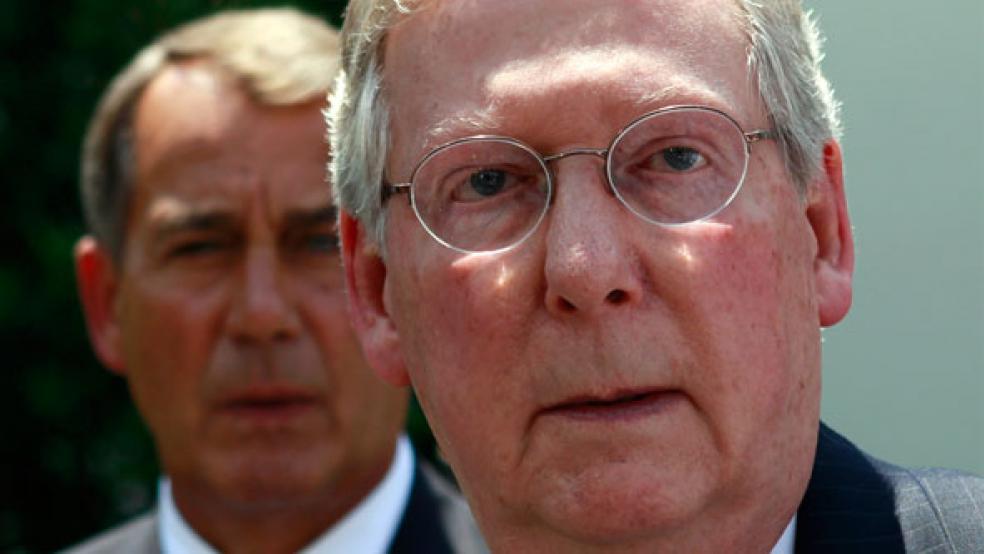Amid reports that the United States, Iran and five other nations have all but reached a final agreement on a deal to prevent Tehran from developing a nuclear weapon for at least the coming decade, Republican leaders warned on Sunday that President Obama faces an uphill struggle to win congressional approval of the agreement in the next two months.
“It’s going to be a very hard sell,” Senate Majority Leader Mitch McConnell (R-KY), said during an interview on “Fox News Sunday.” “I know there will be a strong pull not to go against the president on something that is so important to him, but it is a very hard sell.”
Related: Iran, big powers close to historic deal but sticky issues remain
McConnell echoed the concern of many Republicans and some Democrats that Obama and Secretary of State John Kerry were too eager to seal a deal with the Iranians at nearly any cost – despite Obama’s repeated assurance that he would walk away from a bad agreement. They contend that over the past two years, the administration has moved from seeking to permanently dismantle Iran’s programs for enriching uranium and developing a nuclear weapon to simply trying to manage or contain it for the coming decade.
“No deal is better than a bad deal,” said House Speaker John Boehner (R-OH). “And from everything that’s leaked from these negotiations, the administration has backed away from almost all of the guidelines that they set out for themselves.”
In an interview with CBS’s “Face the Nation” that was taped on Friday, Boehner said that if the agreement somehow is torpedoed and tough economic sanctions against Tehran are kept in place, “At some point the Iranian regime is going to have to change their behavior – abandon their efforts to get a nuclear weapon and stop being the largest state sponsor of terrorism in the world.”
According to media reports, negotiators in Vienna are putting the finishing touches on a final deal in consultation with their leaders back home and likely will formally unveil the details it on Monday. Since a tentative agreement was struck in Switzerland April 2, negotiators have wrestled with an array of thorny issues that forced three extensions of the final deadline.
At the heart of the apparent agreement, Iran has agreed to shelve efforts to produce a nuclear weapon for at least the coming decade in return for the lifting of economic sanctions that have stunted Iran’s economy and tied up hundreds of billions of dollars of their assets in international accounts.
Related: Five Big Questions About the Iran Nuclear Deal
But the obstacles to a final deal included agreement on when the sanctions would be lifted, the amount of access that international atomic energy inspectors would be given to Iranian nuclear facilities, including military installations, and what would happen in the event that Iran breaks the agreement and moves ahead with developing a bomb.
A huge last minute dispute was over a set of United Nations Security Council economic sanctions passed beginning nine years ago in connection with a ban on the shipment of conventional arms into and out of Iran. Iranian negotiators sought to include a lifting of those sanctions as part of the overall deal, while the U.S. and others opposed such a move.
McConnell said today that from what he and others have seen of the emerging final framework, there are not enough safeguards against Iran eventually obtaining a nuclear weapons, which could pose a huge threat to Israel and other U.S. allies in the Middle East.
“We already know that [the deal] is going to leave Iran as a threshold nuclear state,” he said. “We know that.”
“It appears the administration’s approach to this is to enter in any agreement Iran will get into,” McConnell added.
Related: Corker Says Obama May Be Too Eager to Sign Iran Nuke Deal
Because negotiators repeatedly extended the deadline for a final deal, Congress now will have two months in which to review and vote on the final agreement, pushing a final decision into the fall. A law drafted by Senate Foreign Relations Committee Chair Bob Corker (R-TN) and passed in May called for Congress to begin a 30-day review period provided international negotiators reached a final agreement by last Friday. If the negotiators missed that deadline, then Congress would have up to 60 days to review and react to the final agreement.
Under the bipartisan measure agreed to by the administration, lawmakers will have time to review the complex details of the U.S.-Iran deal and vote on a resolution of disapproval if they choose to reject it. However, most observers believe it would be very difficult to pass such a resolution because the Senate would have to muster at least 60 votes to overcome a Democratic filibuster -- a very high bar to clear.
Moreover, even if the House and Senate somehow succeeded in passing the resolution, Obama would be certain to veto the measure – and it would be virtually impossible for the Senate and House to muster the two-thirds votes needed to override a veto. The President has made the Iran nuclear deal a top priority of his second term.
“Clearly, it’s going to be challenging,” Sen. Kelly Ayotte (R-N.H.), a critics of the deal, told Politico recently.
Related: Rare Bipartisanship Rules the Day on Iran Nukes Deal
Sen. Tom Cotton (R-AR), a leading GOP opponent of the Iran nuclear deal, said today that “I think the United States has gone way too far down the road in making concessions to Iran.”
“We have to remember the goal of these negotiations from the beginning,” he said during an appearance on “Face the Nation.” “It was to stop Iran from enriching uranium and developing a nuclear weapons capability.”
“Whatever deal comes out this weekend is going to be dangerous for the United States and dangerous for the world,” Cotton said.
Top Reads From the Fiscal Times:



